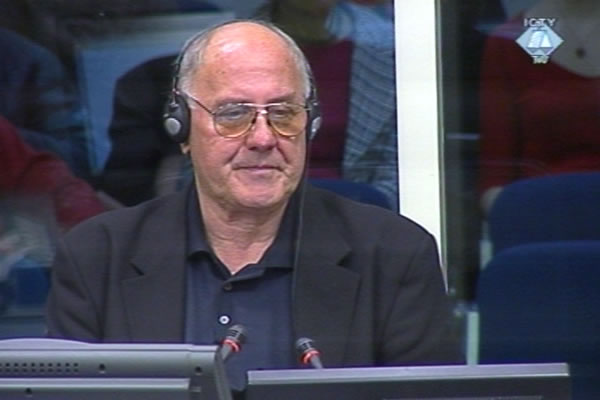Home
‘BLOODY ADMISSION SYSTEM’ IN OMARSKA
On their arrival in the Omarska prison camp, prisoners had to go through a ‘bloody admission system’: beatings that many of them didn’t survive, former prisoner Nusret Sivac said. The defense wants to prove that the SDS Crisis Staff was responsible for the crimes in Omarska, Keraterm and Trnopolje. A former member of the Sarajevo security service began his evidence later today
 Nusret Sivac, witness at the Ratko Mladic trial
Nusret Sivac, witness at the Ratko Mladic trial The examination-in-chief of Nusret Sivac, a journalist from Prijedor, began on Thursday. At the end of the examination-in-chief, Sivac explained why a wall in the Omarska prison camp was called the ‘weeping and wailing wall’. In June 1992, Sivac was held detained in Omarska. In August 1992, he was transferred to Trnopolje, where he remained for about 20 days.
In late July 1992 in Omarska Sivac heard the sound of an engine and the guards shouting, the witness said. Twelve buses had brought in the villagers from the Brdo region who had been rounded up in an ‘ethnic cleansing action’ in several Muslim villages. The guards took them out of the buses. The people were lined up outside, along the wall of the ‘Burko’s and Mujo’s room’, where prominent people from Prijedor were detained. After that, the prisoners heard ‘the guards shouting, the strikes against the wall, cries, screams, wailing and moaning’. ‘We realized that the prisoners had to go through a bloody admission system’, Sivac said, adding that some of the detainees died of the injuries they had sustained at the ‘wailing wall’. In the cross-examination, the defense counsel put it to the witness that he ‘didn’t see’ the people being killed; he just ‘heard’ that they had been killed. Sivac replied that ‘executioners didn’t allow anyone watch them execute people’.
Referring to Sivac’s evidence at the trial of Milomir Stakic, former president of the Prijedor municipality, the defense claimed that the civilian authorities founded the Omarska, Keraterm and Trnopolje prison camps. The defense counsel quoted Sivac as saying that ‘there were no soldiers in Omarska and Keraterm and the army didn’t have jurisdiction over the prison camps that were run by the civilian authorities’.
Sivac confirmed that the prison camps were established by the municipal Crisis Staff, but he corrected his previous evidence, saying that the army was in charge of the security in the prison camps. In the re-examination, the prosecutor reminded Sivac of his testimony that in Omarska he saw a Serb soldier who was shouting and brandishing a weapon with a chambered round. Other soldiers stood behind him. The prosecutor also noted that Major Radmilo Zeljaja was in the delegation that came to visit Omarska in July 1992. Zeljaja was the commander of the VRS 43rd Motorized Brigade. On Thursday Sivac said that the internal security was provided by the active and reserve police and soldiers that were called up. Villagers drafted in the VRS provided security to the outside perimeter.
After Sivac completed his evidence, a former member of the Sarajevo security service began his evidence. He is a protected witness testifying with image distortion and under the pseudonym RM 110. He spoke about the investigations of several artillery and sniper incidents in Sarajevo. The witness was involved in the investigation of three incidents listed in the annex to the indictment against Ratko Mladic: the sniper attack on a tram on 8 October 1994, the explosion of a modified air-bomb on 24 May 1995 and the shelling of the Markale market on 28 August 1995.
In the statement to the prosecution, the witness said that all investigations established that the fire originated on the side controlled by the Bosnian Serbs. The defense will cross-examine the witness on Monday.
Mladic was warned today he would be removed from court because he insisted on communicating verbally with his lawyers during Sivac’s testimony. The Trial Chamber has prohibited this practice. Presiding judge Orie proceeded to inform the public that the third session was nine minutes late because the accused had gone to the toilet for the second time immediately before the session was due to start. ‘The Trial Chamber will not be prepared to wait next time’, Judge Orie told Mladic, adding that next time the accused is late it will be interpreted as a waiver of his right to attend the trial.
Linked Reports
- Case : Mladic
- 2012-11-08 WHO CONTROLLED ARTILLERY AROUND SARAJEVO: MLADIC OR SDS?
- 2012-11-08 ARMY AND PRISONS CAMPS IN PRIJEDOR
- 2012-11-07 STRICT LINE OF COMMAND WITH MLADIC ON TOP
- 2012-11-12 DEFENSE: TRAM HIT BY STRAY BULLET
- 2012-11-15 MLADIC ‘DOMINANT PERSONALITY’ IN THE VRS
- 2012-11-16 WITNESS OF MADNESS IN BILJANI
